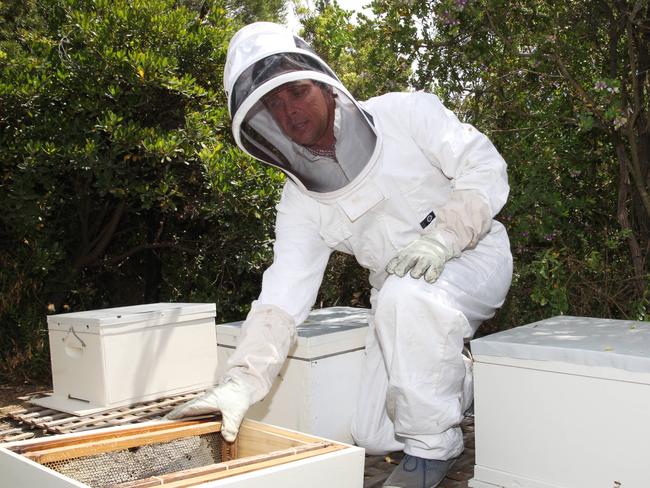Save the Bees Australia founder says controversial mosquito spray would have been devastating
A Mornington Peninsula beekeeper says a controversial mosquito-spraying bid to eradicate the Buruli virus would have devastated local honey production and affected every insect — “even the insects that kill mosquitoes” — if it had have gone ahead.

South East
Don't miss out on the headlines from South East . Followed categories will be added to My News.
Save the Bees Australia founder Simon Mulvany has received an apology from Department of Human Services Victoria chief health officer Dr Brett Sutton for the controversial mosquito spray.
Mr Mulvany said if the spraying blitz had gone ahead on a bigger scale there would have been no local honey on the Peninsula.
He said Dr Sutton conceded the spraying, a bid to eradicate mozzies possibly carrying the harmful Buruli virus, shouldn’t have taken place. Four Rye streets were sprayed earlier this year as a test but the wider plan, which was set to take place in October, was cancelled amid fears about the harmful effects of the chemicals.
Live your best Melbourne life with a Leader Community News subscription
“There’s simply not enough information to say mosquitoes are a vector for the ulcer,” Mr Mulvany said.
He said the Buruli ulcer had decreased on the Peninsula.
“If they had gone through with the spraying, they probably would have been able to form some correlation,” he said.
“They were planning to spray an astronomical area between Portsea and St Andrews, (but) the harmful effects of these chemicals had not been properly communicated.”
Mr Mulvany said the impact on local bee populations, particularly indigenous bees, as well as honey for consumption and medicinal purposes would have been “devastating”.
“Every insect would be affected; tadpoles, frogs and even the insects that kill mosquitoes. The issues arising from the spraying could have been bigger than the ulcer.”
Mr Mulvany said with the “global bee crisis” it had never been more important for bees to live in urban environments.
Dr Sutton said his team was still working to stop the Buruli ulcer.
“I know the research team went about their activity with the best of intentions — they wanted to protect public health and get to the bottom of how Buruli is being transmitted,” he said.
“Going forward, we will make sure liaison happens with the community in the best way possible, with a portal for raising concerns and getting information.”
MORE NEWS
ELDERLY, DISABLED FEAR REMOVAL OF THEIR BACKYARD UNITS
SPACE RUNNING OUT IN CARRUM DOWNS INDUSTRIAL ESTATE
FAKE HOUSE SCAM CLAIM: RENTERS LOSE THOUSANDS
Mornington Peninsula mayor David Gill said the Buruli ulcer was an important issue.
He said the Peninsula had 13 mosquito species, with one known to carry the Buruli ulcer.
“(It) breeds in shallow water, such as bowls for pets or dishes under pot plants — we encourage people to remove these types of water from their properties in the areas affected,” he said.
